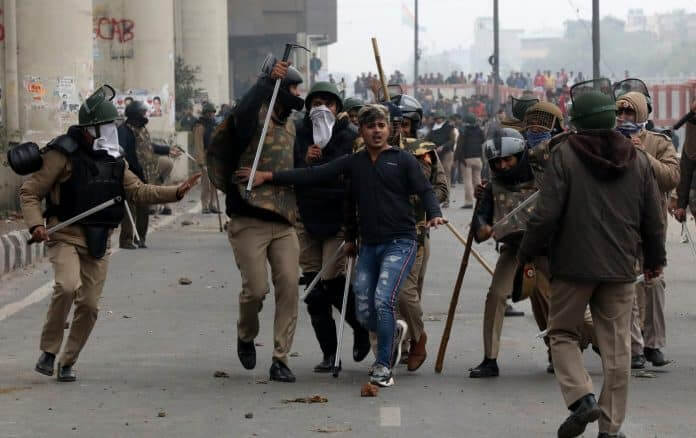
India is on the precipice of implementing one of the most devastating and impactful forced migrations in modern history. Once a proud secular nation, the world’s largest democracy now finds itself fundamentally at odds with the composite culture that defined its hard-fought independence. As the Modi government’s controversial Citizenship Amendment Act (CAA) takes effect, so too do millions of minorities in India – primarily Muslims – find themselves increasingly disaffected and marginalised. Coupled with the recent update to the National Register of Citizens (NRC), it is clear: Modi’s India is not an India for all.
The introduction of the CAA marks the latest episode in a legislature increasingly motivated to protect Hindu nationalism in India. Emboldened by its staggering majority in the 2019 Lok Sabha election, Modi’s BJP party has moved even further to the right in its policy and its rhetoric, commencing with the revocation of the special status of Jammu and Kashmir, and the updates to the NRC that Modi pledged in his historic election campaign.
The NRC currently operates only in the north-eastern state of Assam, by no small coincidence being the state of India with the highest number of Muslim citizens (other than India-controlled Kashmir). It counts as citizens those who can prove they resided in India before 24 March 1971 (the day before Bangladesh declared its independence from Pakistan). In August this year, the NRC was updated pursuant to a Supreme Court order, with the promise of identifying “genuine” citizens and expelling illegal immigrants who failed to prove their citizenship.
However, the NRC ultimately omitted almost 2 million of those who had applied to have their citizenship recognised, including, unexpectedly to the BJP, a large number of Bengali Hindus. Each of these people faced being placed in detention camps and deported unless they could prove their citizenship. Proving citizenship is a costly exercise, and nearly a quarter of the Assamese population is illiterate. In November, Home Minister Amit Shah pledged to roll out the NRC across all Indian states.
The unexpected outcome of the NRC exercise in Assam lays bare the true impact of the CAA. Framed by the BJP as distinct from the NRC, the CAA allows illegal immigrants from
Afghanistan, Pakistan or Bangladesh who entered India on or before 31 December 2014 to apply for Indian citizenship, relaxing the more onerous existing requirements.
On its face, the CAA is a humanitarian measure aimed at providing amnesty to those fleeing religious persecution. However, the CAA only does so for Hindus, Sikhs, Buddhists,
Jains, Parsis and Christians from those countries, on the basis that the likelihood of Muslims facing persecution in those countries is low.
Taken together with the NRC, the CAA essentially gives those Bengali Hindus excluded from the NRC in Assam a second chance at citizenship, while ignoring omitted Muslims. If the NRC is extended across India’s entire population as planned, the implications are enormous for those of India’s 200 million Muslims who lack documentary evidence of their citizenship.
The same ramifications apply for other minorities excluded from the scope of the CAA’s protection, such as Sri Lankan Tamil refugees in Tamil Nadu. Even with no clear direction on where illegal immigrants would be deported – Bangladesh has already stated it will not take them in – India is on the brink of risking a forced migration of stateless civilians which could dwarf Myanmar’s Rohingya crisis.
While the United Nations has described the CAA as “fundamentally discriminatory in nature”, the BJP has, typically, refused to temper its rhetoric. In April, then-BJP President Amit Shah referred to Muslim immigrants from Bangladesh as “termites” and that the NRC would help “remove them”.
Even in the face of growing and ongoing protests, including widespread violence at universities and an open letter penned by nearly 1000 scientists and scholars, Shah has demonstrated staggering indifference, stating “You can protest against any policy that you want, but the BJP’s Narendra Modi government is firm. It will give citizenship to all refugees (as defined under CAA) and they will live as Indian citizens with pride”.
The BJP’s stance is a predictable by-product of the mandate with which it found itself forming government earlier this year. But it is also reflective of the increasingly isolationist and inward-looking views of not just the BJP’s constituents, but India as a whole, as the country continues to jostle for a strong identity on the global stage. In fact, some scholars have taken the view that in modern India, embracing some form of Hindutva ideology is essentially the only legitimate stance that can be taken by an electorally successful nationwide party on either side of the political spectrum.
The CAA and NRC are only two elements of the sharp divide being deepened across India’s fractured population. However, in blurring the line between secularism and theocracy, these
measures could do far more damage than displacing swathes of undocumented residents; in fact, they may redefine the very foundations upon which the nation was built.




